
Best Fleet Fuel Cards: Your Complete Guide to Savings, Security, and Smart Fleet Management
Fleet managers face mounting pressure to control fuel costs while maintaining operational efficiency in an increasingly complex transportation landscape. Finding the best fleet fuel cards requires evaluating discount programs that can save money up to $1.85 per gallon on diesel fuel, security features that prevent fraud losses, and acceptance networks spanning 95-99% of U.S. gas stations where drivers purchase fuel daily.
TL;DR / Quick Summary
- Voyager leads acceptance with 97% of U.S. gas stations while charging zero monthly fee
- AtoB offers maximum savings with up to $1.85/gallon diesel fuel discounts through mobile app optimization.
- WEX provides comprehensive networks at 95% acceptance, but charges $2-4 monthly per card fee
- Trucking-focused fleet cards like TCS and Comdata deliver 40-44¢/gallon average savings at truck stops
- Fee structures vary dramatically from $0 (Voyager) to $400+ monthly fee (enterprise accounts)
- Technology integration is driving better fraud protection and real-time savings optimization
{{CTA}}
Top 10 Best Fleet Fuel Cards
1. AtoB Fleet Card

The AtoB fuel cards position themselves as the technology leader among the best fleet fuel cards, offering some of the most aggressive discount structures in the market through its mobile-first approach. The card offers potential savings of up to $1.85 per gallon on diesel fuel and 5¢ per gallon on unleaded gasoline. Still, it requires drivers to use the mobile app to identify participating stations and maximize fuel discounts.
Key features:
- Up to $1.85 per gallon diesel savings, 5¢ per gallon unleaded gas
- 99.9% acceptance via the Mastercard network at gas stations
- Two card options: Flex (credit) and Unlimited (prepaid)
- Premium service available for $3/month with advanced spending controls
The AtoB system excels for tech-savvy fleets comfortable with mobile app dependencies. The card works at over 30,000 gas stations and 3,000+ truck stops, with an average reported savings of 42¢ per gallon through optimized station selection. However, maximum fuel discounts require consistent mobile app usage, which may pose a challenge to operations with less tech-savvy drivers.
The fee structure includes a $35 setup cost and monthly charges of $15 for 1-5 Flex cards or $3 per active Unlimited card. Get started with AtoB's fuel savings platform to see real-time discount opportunities in your area and better control costs.
2. Fuelman Fleet Cards
%20logo.jpg)
Fuelman operates with a subscription-based pricing model unique among fleet fuel cards, offering three service tiers with flat monthly costs regardless of card quantity. This structure makes Fuelman particularly attractive for large fleets where the fixed account fee is distributed across numerous cards for better expense management.
Service tiers and pricing:
• Basic: $39 monthly fee per account
• Pro: $59 monthly fee per account
• Enterprise: $99 monthly fee per account
The Fuelman mixed fleet card delivers 8¢ per gallon rebates at 40,000 locations, while the Diesel Fleet Card provides up to 12¢ per gallon on diesel fuel purchases. Acceptance covers 60,000 gas stations and truck stops, providing adequate coverage for most operations while focusing on optimized discount arrangements at preferred fueling stations.
Pros:
• Fixed monthly costs are ideal for large fleets
• Strong diesel fuel discounts up to 12¢ per gallon
• Comprehensive fraud protection and spending controls
Cons:
• Limited customer satisfaction (2.2/5 Trustpilot rating)
• May be expensive for small businesses
• More limited acceptance than universal providers
3. Shell Fleet Navigator
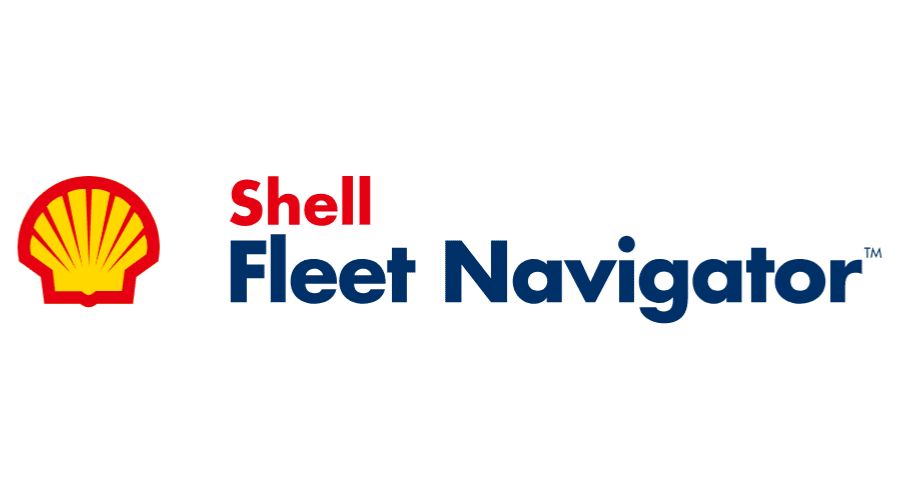
Shell's 2025 partnership with WEX has transformed its fleet card offerings, introducing the Shell Card Business and Shell Card Business Flex to replace previous products. This collaboration combines Shell's retail fuel expertise with WEX's financial infrastructure to enhance fleet management capabilities and improve expense tracking and management.
The Shell fleet offers fuel discounts of up to 6¢ per gallon at Shell stations, while also extending acceptance to 95% of U.S. gas stations through the EX partnership. The Business Flex variant serves large fleets with similar discount structures plus additional rebates at designated service stations.
Notable features:
• Zero setup, annual, and monthly fees
• Electric vehicle charging support across multiple networks
• 95% U.S. gas stations accept beyond Shell's 12,000+ locations
• Integrated fuel and EV charging expense reports
Both cards eliminate traditional card fee structures while providing operational flexibility beyond Shell's geographic footprint. The integration of electric vehicle charging capabilities positions Shell advantageously for mixed fleet operations, incorporating alternative energy sources.
4. EFS Fleet Card
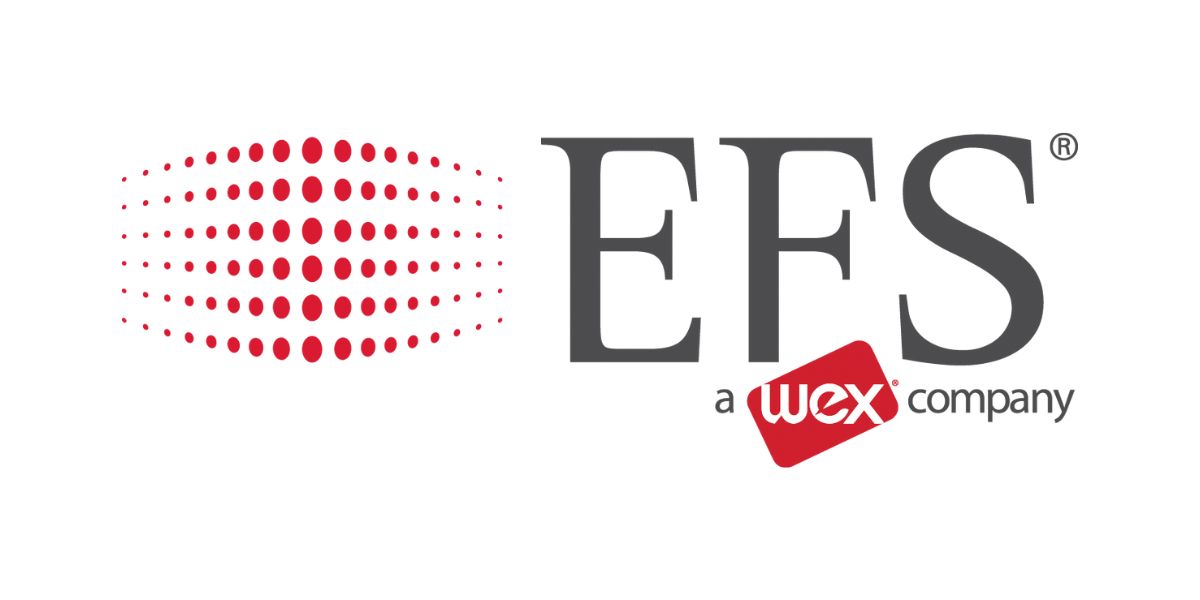
EFS (Electronic Funds Source) has historically focused on the trucking sector, providing specialized services for over-the-road operations and commercial transportation businesses. The card offers competitive fuel discounts at major truck stop chains while maintaining broad acceptance for operational flexibility and effective expense management.
EFS emphasizes commercial trucking partnerships with Love's, TA Petro, and other major truck stop networks. The card typically provides fuel discounts ranging from 15¢ to 25¢ per gallon at participating commercial locations, although exact discount rates vary by location and the volume of fuel purchases.
Target market:
• Over-the-road trucking operations
• Mixed fleet operations requiring truck stop access
• Businesses seeking commercial fuel quality standards
The EFS network offers extensive coverage at commercial truck stops, featuring dedicated diesel fuel lanes, commercial-grade fuel quality, and truck-specific amenities that support long-haul operations and help control costs.
5. Coast Fleet Card

Coast positions itself as "America's top-rated fuel card" with acceptance anywhere Visa is accepted, providing operational flexibility that exceeds traditional fuel card networks. The card offers enhanced fraud protection through GPS-based transaction verification and real-time activity monitoring, along with advanced spending controls.
Pricing and features:
• $4 per active card monthly fee
• 4-10¢ per gallon discounts at 30,000+ stations
• 1% cash back on non-fuel vehicle expenses
• GPS tracking and fraud protection system
Coast's integration with popular fleet management systems enables automatic odometer data matching and vehicle import capabilities, eliminating the need for manual data entry. The company offers unlimited card availability without additional charges, providing operational flexibility for businesses with varying fleet sizes and seasonal fuel consumption.
The GPS tracking system compares transaction locations with vehicle positions to identify potentially fraudulent activity. Setting spending limits and providing real-time alerts provides comprehensive security layers for better expense management.
6. Comdata Fleet Card
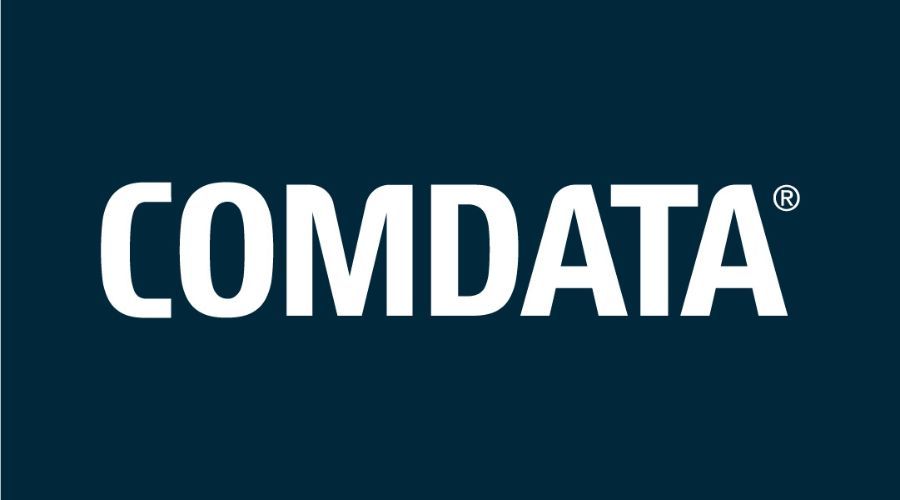
Comdata has established itself as a leader in trucking-focused fuel management, with acceptance at over 8,000 truck stops, including major chains like TA Petro, Love's, and Pilot Flying J. The card offers some of the most competitive fuel discounts available to commercial transportation operations, enabling fleet managers to control costs effectively.
Discount highlights:
• Up to 40¢ per gallon at TA Petro locations
• 8¢ off at Pilot Flying J, Love's, Casey's locations
• Specialized pricing for fleets under 20 vehicles
Comdata offers both credit-based fleet cards and prepaid Connect Cards, catering to the diverse financial profiles within the trucking industry. The prepaid option provides immediate access to fuel card programs, eliminating credit requirements and ongoing financial monitoring, thereby improving cash flow for small businesses.
Fee structure:
• Up to $8 per card monthly fee
• $50 account setup fee
• Extended network fees: $3 per transaction
The higher card fee structure reflects specialized services and deeper discount arrangements typical of trucking-focused providers, where substantial fuel savings often justify premium service costs. For transportation businesses that primarily purchase fuel at truck stops, Comdata's discount rates can exceed monthly fees by substantial margins.
7. RTS Financial Fleet Card
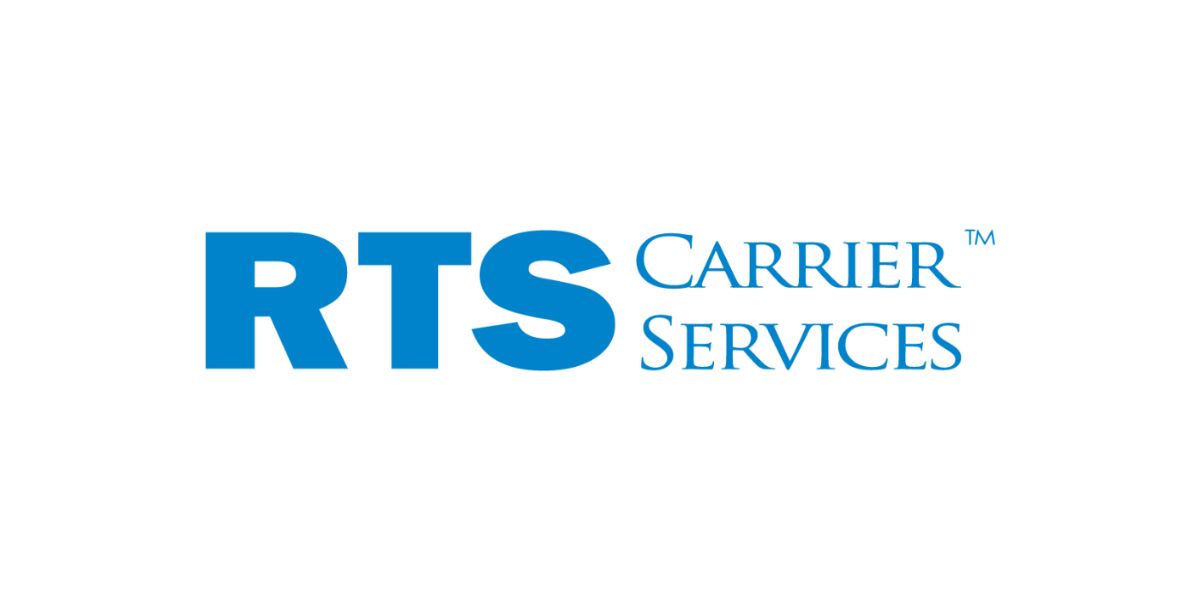
RTS Financial specializes in small to medium-sized fleet operations, offering competitive fuel discounts while maintaining reasonable fee structures and an extensive network of acceptance, making it suitable for regional and local businesses seeking to manage expenses effectively.
The card typically offers fuel discounts of 8-15¢ per gallon at participating gas stations while providing acceptance at major fuel chains nationwide. RTS focuses on delivering value through competitive pricing rather than extensive additional services for expense tracking.
Key benefits:
• Competitive per gallon discounts
• Reasonable fee structures for small businesses
• Standard acceptance at major fuel chains and service stations
• Simplified expense management and reporting
RTS targets the middle market, situated between large-scale commercial operations and small local businesses, by providing professional fuel management services that eliminate the complexity and maintenance costs associated with enterprise-level providers.
8. WEX Fleet Cards
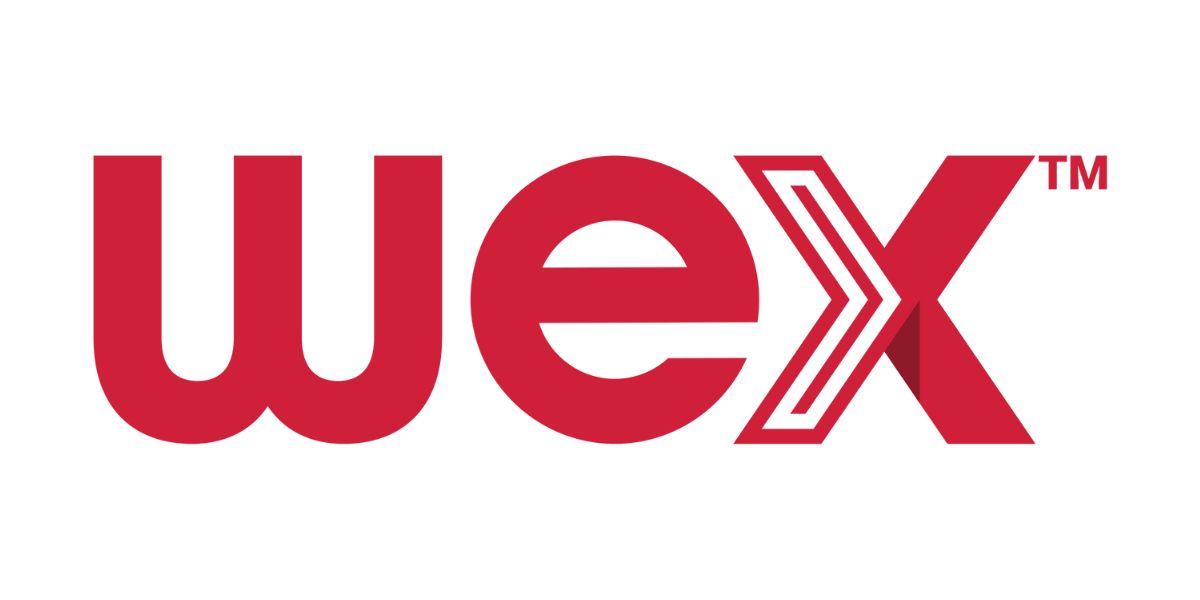
WEX operates one of the most extensive fuel card programs in the industry, with acceptance at 95% of U.S. gas stations and a comprehensive suite of financial services extending beyond basic fuel management. The company's freight factoring services create synergies for transportation businesses seeking consolidated financial partnerships and improved cash flow.
Network and pricing:
• 95% U.S. fuel station acceptance
• Monthly fee: $2-4 per card
• $40 account setup fee
• Volume-based rebates: 1-3¢ per gallon
WEX's discount programs demonstrate sophisticated market segmentation, with volume-based rebates for universal usage and up to 8¢ per gallon through brand-specific partnerships. The tiered approach caters to diverse customer segments, ranging from small businesses to large fleets, with comprehensive expense tracking capabilities.
Advanced features:
• Open API architecture for system integration
• Comprehensive expense reports and analytics
• Fraud protection with real-time monitoring
• Mobile applications for drivers and fleet managers
However, customer satisfaction metrics show challenges with 1.4/5 star ratings for the fuel card division, despite strong performance in other business units.
9. Motive Fleet Card
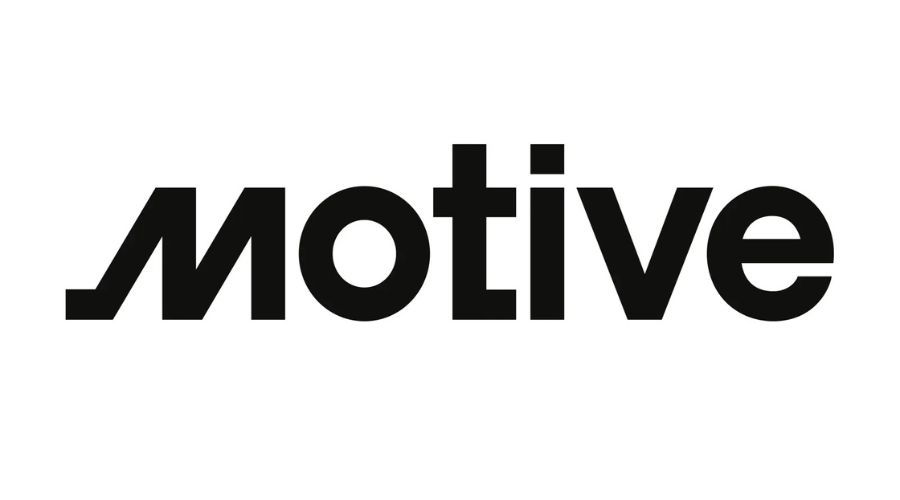
Motive (formerly KeepTruckin) integrates fuel card services with its comprehensive fleet management platform, providing unified expense tracking, telematics integration, and operational analytics in a single system for better vehicle expenses monitoring.
The Motive approach emphasizes seamless data integration between fuel purchases, vehicle tracking, maintenance scheduling, and driver management systems. This integration eliminates the need for separate systems and manual data reconciliation while providing detailed expense reports.
Integration benefits:
• Automated expense tracking and reporting
• Real-time fleet efficiency monitoring
• Integrated vehicle maintenance scheduling based on fuel consumption
• Unified driver and vehicle management with spending controls
For fleets already using Motive's telematics and fleet management services, the fuel card integration provides operational efficiencies that may justify premium pricing structures and monthly fees.
10. P-Fleet Card
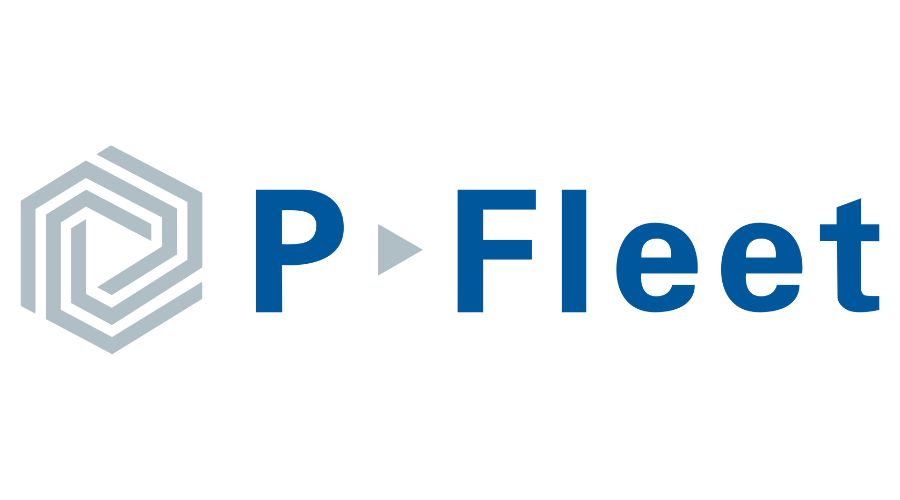
P-Fleet focuses on providing straightforward fuel management solutions with competitive pricing and minimal complexity, targeting small businesses that seek reliable fuel card services without the need for extensive additional expense management features.
The card emphasizes simplicity in both pricing and usage, providing consistent discount rates at participating gas stations while maintaining transparent fee structures and standard acceptance networks for effective cost control.
Core features:
• Transparent pricing with minimal fees
• Consistent discount rates across the network
• Standard acceptance at major fuel chains and service stations
• Simplified account management and expense reports
P-Fleet appeals to businesses prioritizing simplicity and cost-effectiveness over advanced features or extensive service offerings for fleet management.
{{CTA}}
What Makes a Fleet Fuel Card the "Best" for Your Business?
Determining the best fleet fuel cards requires evaluating multiple factors that align with your specific operational requirements, route patterns, and financial priorities. The "best" fuel card varies significantly between a local delivery service operating within a 50-mile radius and a long-haul trucking company crossing multiple states daily to purchase fuel.
Essential evaluation criteria include:
- Route compatibility: Fleet cards must provide adequate acceptance along your regular routes at gas stations
- Discount optimization: Fuel discounts must exceed fees and operational constraints to save money
- Security requirements: Fraud protection should match your risk exposure with proper spending controls
- Technology needs: Integration capabilities must support your operational systems for expense tracking
- Service quality: Customer support should align with your reliance on provider assistance
Acceptance network coverage represents the most fundamental requirement, as even substantial fuel discounts become worthless if drivers cannot purchase fuel when needed. Universal providers, such as Voyager (97% acceptance) and WEX (95% acceptance), minimize operational constraints but may offer lower discount rates than specialized providers.
For technology-forward operations, fleet cards like AtoB that leverage mobile apps for discount optimization can provide substantial savings—but only if drivers consistently use the required technology. Traditional operations may find better value in straightforward cards like Voyager, which provide predictable service without technology dependencies, while helping to control costs.
Cost structure alignment remains critical, as the difference between per-card and account-based fees can dramatically impact total program costs. A five-card fleet faces annual costs ranging from $0 (Voyager) to $2,400 (Comdata), making fee structure selection crucial for small businesses.
Evaluate your fleet's specific requirements by analyzing current fuel spending patterns, route consistency, and operational priorities before committing to any provider.
Which Fleet Fuel Cards Offer the Best Discounts?
Fuel discounts vary dramatically among fleet fuel cards, with maximum savings ranging from a modest 3¢ per gallon to an exceptional $1.85 per gallon, depending on provider, location, and operational compliance with program requirements for fuel purchases at participating gas stations.
Highest discount providers:
Universal provider discounts:
• Voyager: 3-8¢ per gallon at select locations
• WEX: 1-3¢ per gallon volume rebates, up to 8¢ brand-specific
• Shell: Up to 6¢ per gallon at Shell stations
The highest fuel discounts typically require operational compromises—either limited station networks, technology dependencies, or specific fueling behaviours. AtoB's exceptional $1.85 per-gallon diesel discount requires drivers to use mobile apps for station selection, potentially limiting operational flexibility for time-sensitive deliveries.
Trucking-specialized providers like TCS and Comdata justify their higher discount rates through partnerships with truck stops that benefit from predictable, high-volume commercial fuel sales. These fuel discounts are often applied specifically to diesel purchases at commercial truck stops, rather than at general retail locations.
Brand-specific cards provide moderate discounts balanced with operational convenience. Shell's 6¢ per gallon discount applies broadly across its 12,000+ locations, while maintaining 95% acceptance through its WEX partnership—a structure that many fleets find optimal for balancing savings with flexibility.
Evaluating true discount value requires considering:
• Availability of gas stations along regular routes
• Operational time costs of accessing discount locations
• Technology requirements for maximum savings
• Seasonal or regional discount variations
What Are the Best Fleet Fuel Cards for Small Businesses?
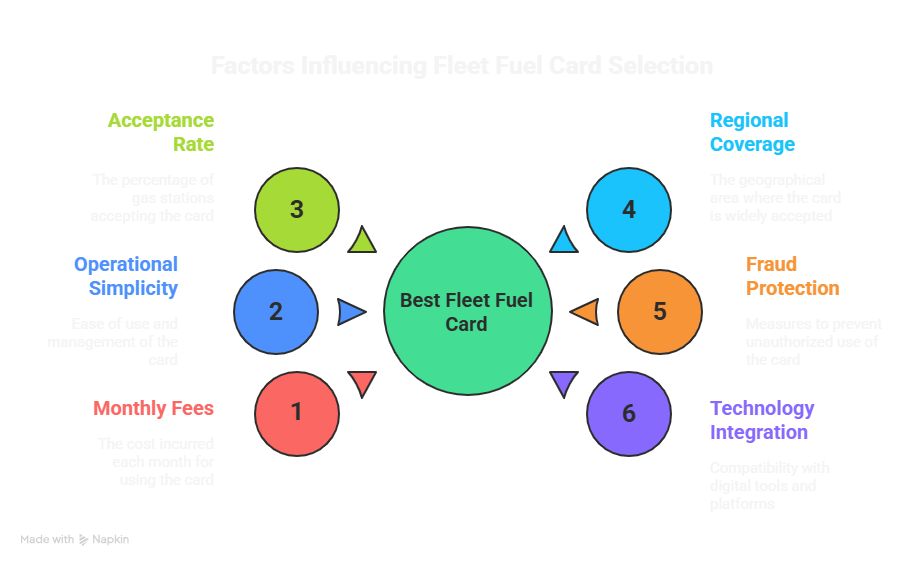
Small businesses face unique challenges when selecting fleet fuel cards, as monthly fees can represent a significant percentage of total fuel costs. At the same time, operational simplicity often takes precedence over advanced features that large fleets require for comprehensive expense management.
Top small business recommendations:
1. Voyager Fleet Card
• Zero fees (no monthly fee, setup, or replacement charges)
• 97% acceptance across U.S. gas stations
• Simple fraud protection without complexity
2. Circle K Pro Fleet Card
• No monthly fee or annual fees
• Strong regional coverage in Circle K markets
• Straightforward fuel discounts structure
3. AtoB Unlimited Card
• $3 per active card monthly fee
• Technology-driven savings for tech-comfortable operations
• Prepaid structure eliminates credit requirements
Small business evaluation priorities:
Small businesses typically benefit most from fleet cards that eliminate monthly fees, as a $4 monthly charge per card represents $ 48 annually for a 12-card fleet. This substantial cost may exceed fuel discount benefits for lower-volume operations and impact cash flow.
Voyager's zero-fee structure, combined with its near-universal acceptance, makes it ideal for small businesses that prioritize simplicity and cost control. The card offers consistent discounts of 3-8¢ per gallon at select locations, eliminating operational constraints and technology requirements for expense tracking.
For small businesses operating primarily within specific regions, brand-specific cards like Shell may provide optimal value through higher discount rates (6¢ per gallon) while maintaining zero fees and reasonable acceptance within their geographic coverage areas.
Technology-forward small businesses may benefit from AtoB's mobile-driven discount optimization, particularly if drivers are comfortable using smartphones to select stations and maximize savings. However, the $3 monthly fee per active card requires analysis against potential fuel discounts.
Small business owners can evaluate their specific savings potential by analyzing current fuel spending, route patterns, and operational capabilities before selecting a provider.
Which Fleet Fuel Cards Have the Lowest Fees?
Fee structures represent one of the most significant cost considerations when selecting fleet fuel cards, with annual costs ranging from $0 to over $4,000, depending on the chosen provider and fleet size, which directly impacts cash flow and expense management capabilities.
Zero-fee options:
Voyager Fleet Card
• No monthly fee for cards
• No account setup fees
• No replacement card charges
• No out-of-network penalties
• No membership or invoice fees
Shell Card Business/Business Flex
• Zero setup, annual, and monthly fees
• 95% acceptance through the WEX partnership at gas stations
• Up to 6¢ per gallon discounts at Shell stations
ExxonMobil BusinessPro
• No setup, annual, or card fee
• 95% acceptance network
• Up to 6¢ per gallon on Synergy fuels
Low-fee competitive options:
The fee structure comparison reveals significant cost variations that can impact annual expenses by thousands of dollars for medium to large fleets. A 25-card operation faces an annual fee range from $0 (Voyager) to $2,400 (Comdata's $8 monthly per card).
Hidden fee considerations:
• Transaction fees: $2-3 per extended network transaction
• Administrative charges: Report generation, research services
• Late payment penalties: Often $75+ or percentage of balance
• Replacement card costs: Typically $2-10 per card
Zero-fee providers like Voyager generate revenue through other mechanisms, potentially including interchange fees from fuel station partnerships, which may influence the final pump prices paid by cardholders. However, the elimination of direct customer fees offers significant cost advantages for price-sensitive operations seeking to enhance their cash flow.
Usage-based billing, as employed by Coast's "active card" model, ensures that businesses only pay for cards with transaction activity within the billing period. This approach benefits fleets with seasonal operations or variable usage patterns where traditional per-card fees may exceed actual utilization.
Volume-based fee structures, like Corpay's elimination of monthly charges for accounts with ten or more cards, provide cost advantages for large fleets while potentially disadvantaging smaller operations through higher per-card rates.
How Do Credit Requirements Vary Among Fleet Cards?
Credit requirements for fleet fuel cards range from no credit checks required to comprehensive financial evaluations that may exclude newer businesses or those with challenged credit histories. Understanding these requirements is crucial for businesses planning fuel card implementation timelines and effectively managing application processes.
No credit check required:
Prepaid/Debit Cards:
• AtoB Unlimited (prepaid structure)
• Comdata Connect Card (prepaid option)
• Various small provider prepaid offerings
Credit-based cards with flexible requirements:
• AtoB Flex: "Fast and simple" application without hard credit checks
• Coast: Streamlined approval process
• Voyager: Standard credit evaluation but competitive approval rates
Traditional credit requirements:
• WEX: Comprehensive financial evaluation, including business credit history
• Fuelman: Credit checks for subscription plans
• Comdata Fleet Card: Standard commercial credit evaluation
Credit evaluation factors:
Prepaid fuel cards eliminate credit requirements by requiring businesses to load funds before usage; however, this approach may limit credit-building opportunities and necessitate more active cash flow management. The AtoB Unlimited card provides immediate approval capabilities while maintaining access to discount networks and fleet management features.
Credit-based providers typically establish spending limits based on business revenue, credit history, and operational requirements. These limits may start conservatively and increase over time as payment history establishes trust relationships with providers, potentially requiring a personal guarantee.
Some credit-based cards offer credit bureau reporting services that help businesses establish and maintain commercial credit profiles through consistent payment performance. AtoB specifically mentions "free, monthly reporting to Experian to help strengthen your credit profile," providing value beyond basic fuel management services.
Newer businesses or those with limited credit history should prioritize providers offering prepaid options or flexible approval processes while planning longer-term transitions to credit-based programs that provide credit-building opportunities and potentially better discount rates.
Industry-specific providers, such as Comdata and TCS, may offer more flexible credit policies for transportation businesses due to their understanding of industry cash flow patterns and operational requirements. However, credit evaluation standards remain important for establishing appropriate spending limits.
Business owners can explore credit options and approval processes by contacting providers directly to discuss specific circumstances and application requirements.
How to Choose the Right Fleet Fuel Card for Your Operation

Selecting the optimal fleet fuel card requires a systematic evaluation of operational requirements, cost considerations, and service priorities that align with your specific business model and geographic coverage needs for effective expense management and fleet efficiency optimization.
Step-by-step selection process:
1. Analyze Current Fuel Spending Patterns
- Monthly fuel purchase volume and costs
- Primary fueling locations and gas station brands
- Geographic coverage requirements
- Seasonal variations in fuel consumption
2. Evaluate Route Compatibility
- Map regular routes against provider networks
- Identify critical fueling stations
- Assess backup fueling options for operational flexibility
- Consider driver preferences and convenience factors
3. Calculate Total Cost of Ownership
- Compare fee structures across providers
- Estimate potential fuel discounts based on usage patterns
- Factor in administrative costs and time requirements
- Project annual costs across different provider options
4. Assess Technology and Integration Requirements
- Existing fleet management system compatibility
- Driver technology comfort levels for expense tracking
- Reporting and analytics requirements
- Real-time monitoring and spending controls are needed
Implementation timeline considerations:
Common selection mistakes to avoid:
- Focusing solely on advertised discount rates without considering acceptance limitations
- Underestimating the impact of monthly fees on total program costs and cash flow
- Choosing overly complex systems that exceed operational requirements
- Failing to consider driver adoption challenges for technology-dependent solutions
Fleet size significantly influences optimal provider selection, with smaller operations typically benefiting from zero-fee or low-fee providers. In contrast, large fleets may justify premium services through operational efficiencies and volume-based savings.
Geographic concentration affects network requirements, as fleets operating within specific regions may benefit from brand-specific cards with higher local discount rates. At the same time, operations crossing multiple states require universal acceptance networks at gas stations.
Driver demographics influence the potential for technology adoption, making mobile-dependent discount programs like AtoB more suitable for tech-savvy operations. At the same time, traditional systems may better serve less technology-oriented workforces.
Final evaluation checklist:
□ Network coverage aligns with operational routes at service stations
□ Fee structure provides a positive cost-benefit analysis
□ Credit requirements match business financial profile
□ Technology requirements align with operational capabilities
□ Customer service quality meets support needs
□ Integration options support existing business systems
FAQs
What fleet fuel card has the most acceptance locations?
Voyager Fleet Card leads in acceptance, with 97% coverage of U.S. gas stations and truck stops, followed closely by WEX at 95% coverage. Both fleet cards offer near-universal fueling options, minimizing operational constraints for drivers across all geographic regions when they need to purchase fuel.
Cards that leverage major credit card networks (Visa/Mastercard), such as AtoB and Coast, technically offer broader merchant acceptance, but focus primarily on fuel station networks for discount programs. Traditional closed-loop fleet cards, such as Voyager and WEX, offer more extensive dedicated fuel station coverage through specialized partnerships.
Do the best fleet fuel cards require minimum purchase volumes?
Most fleet fuel cards do not require minimum purchase volumes, though some providers offer volume-based discount tiers that provide better rates for higher fuel consumption levels. Fuelman and WEX both offer volume rebates that increase savings for larger fuel purchases, without requiring mandatory minimums.
Specialized trucking providers may have informal volume expectations to justify deep discount rates, but contractual minimum requirements are uncommon. Small businesses can typically access the same discount programs as larger operations, although per-gallon rates may vary depending on the provider's discount structures.
Can mixed fleets use the same fuel card for gas and diesel?
Yes, most modern fleet fuel cards support both gasoline and diesel fuel purchases on the same card system. Fuelman specifically offers a "mixed fleet card" designed for operations running both light-duty gasoline vehicles and heavy-duty diesel equipment.
Providers like AtoB, WEX, and Voyager all accommodate mixed fuel types, offering different fuel discounts for gasoline versus diesel purchases. Some specialized diesel fuel discounts may only apply to commercial diesel grades at truck stops rather than automotive diesel at retail service stations.
Which fleet cards work best for regional vs long-haul operations?
Regional operations benefit most from brand-specific cards, such as Shell or ExxonMobil, which offer higher discount rates (6¢ per gallon) within their geographic coverage areas while maintaining reasonable backup acceptance through partnerships.
Long-haul operations require universal acceptance fleet cards, such as Voyager (97% coverage) or WEX (95% coverage), that ensure consistent fuel availability regardless of route variations. Trucking-focused providers like Comdata and TCS also excel in long-haul operations through extensive partnerships with truck stops and access to commercial-grade fuel.
Are there fleet fuel cards that don't charge monthly fees?
Multiple providers offer zero monthly fees, including Voyager Fleet Card (completely fee-free), Shell Card Business, and ExxonMobil BusinessPro. These fleet cards eliminate the most significant recurring cost component while maintaining competitive discount rates and broad acceptance networks.
Circle K Pro Fleet Card also provides zero fees but limits acceptance to Circle K locations, making it suitable for regional operations with adequate Circle K coverage along regular routes. Businesses can explore fee-free options while evaluating the total cost of ownership, including potential fuel savings.
Do top fleet cards offer same-day approval?
Same-day approval availability varies by provider and credit requirements. Prepaid cards, such as AtoB Unlimited, typically offer immediate approval since they don't require credit checks, whereas credit-based cards may require 1-3 business days for a financial evaluation.
Coast emphasizes streamlined approval processes, while traditional providers like WEX and Comdata typically require standard commercial credit evaluation timelines. Businesses requiring immediate access should prioritize prepaid options or contact providers directly about expedited processing for urgent operational needs.
Can seasonal fleets benefit from the best fuel card programs?
Seasonal fleets can optimize costs through usage-based fee structures, such as Coast's "active card" billing, which only charges for cards with transaction activity within billing periods. This approach eliminates monthly fees during non-operational seasons while maintaining card availability for peak periods.
Fixed-fee providers, such as Fuelman, may be less suitable for seasonal operations, as monthly account fees continue regardless of usage levels. Zero-fee providers, such as Voyager, offer consistent value for seasonal operations, eliminating ongoing costs during periods of low activity.
Which fleet cards integrate with popular fleet management software?
AtoB and Coast lead integration capabilities through modern API architectures and partnerships with telematics providers like Samsara. These fleet cards offer automated data sharing, eliminating the need for manual expense tracking and enabling comprehensive fleet management analytics.
WEX offers an open API architecture for custom integrations, while Motive provides native fuel card integration with its comprehensive fleet management platform. Traditional providers may require third-party integration solutions or manual data import processes to connect their fleet management systems.
In a Nutshell
The best fleet fuel cards in 2025 offer significant variations in discount rates, fee structures, and operational requirements, making careful selection of the provider crucial for cost optimization and operational efficiency. Voyager's zero-fee structure, with a 97% acceptance rate, provides the foundation for cost-conscious operations. Meanwhile, AtoB's technology-driven approach offers an exceptional savings potential of up to $1.85 per gallon for fleets that adopt mobile optimization.
Success requires matching provider capabilities to operational realities—universal fleet cards, such as WEX, serve diverse operations that require maximum flexibility, while specialized providers, like Comdata and TCS, deliver superior value for trucking-focused businesses willing to optimize routes around preferred networks.
Businesses ready to optimize their fuel management should evaluate providers based on total cost of ownership, route compatibility, and long-term operational requirements rather than focusing solely on advertised discount rates.
{{CTA}}
Citations:
[1] American Transportation Research Institute. (2024). "Fleet Operating Cost Analysis." https://truckingresearch.org/
[2] Federal Motor Carrier Safety Administration. (2024). "Commercial Vehicle Fuel Efficiency Standards." https://www.fmcsa.dot.gov/
[3] WEX Inc. (2024). "Fleet Card Network Analysis." https://www.wexinc.com/
[4] Coast Financial. (2024). "Fleet Fuel Card Market Report." https://coastpay.com/
[5] Fuelman Fleet Services. (2024). "Commercial Fuel Discount Programs." https://www.fuelman.com/
Get started with AtoB



.jpg)
